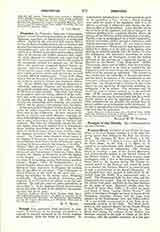

Precentor (L. Praecentor, from prae, before—cantor, singer), a word describing sometimes an ecclesiastical dignitary, sometimes an administrative or ceremonial officer. Anciently, the precentor had various duties: he was the first or leading chanter, who on Sundays and greater feasts intoned certain antiphons, psalms, hymns, responsories etc.; gave the pitch or tone to the bishop and dean at Mass (the succentor performing a similar office to the canons and clerks); recruited and taught the choir, directed its rehearsals and supervised its official functions; interpreted the rubrics and explained the ceremonies, ordered in a general way the Divine Office and sometimes composed desired hymns, sequences, and lessons of saints. He was variously styled capiscol (caput scholae, head of the choir-school) prior scholae, magister schoace, and primicerius (a word of widely different implications). Victor of St. Hugo tells us that in the care of the primicerius were placed the acolytes, exorcists, lectors, and psalmists (chanters). In the Middle Ages the principal dignitaries of cathedrals, collegiate chapters, and monastic orders, imitated the example of St. Gregory the Great in acting as directors of chant-schools. The schola was always in attendance when the bishop officiated in his cathedral, and to the precentor was assigned a place near the bishop and high in dignity. His office was obviously one demanding much learning and executive ability, and his dignity corresponded with his duties.
In the cathedrals of England, France, Spain, and Germany, he ranked sometimes next to the dean, sometimes next to the archdeacon. In some instances his sphere of activity was much broader, including the duty of installing deans, canons, and other dignitaries; and in some monasteries, the duties of librarian and registrar. But from the fourteenth century his title and dignity were largely handed over to incumbents whose musical knowledge did not fit them for the duties to which the name of precentor owed its origin; the dignities remained, but the duties became obscured. “In France, some chapters retain traces of the dignity of Precentor, and one may see sometimes an archdeacon, sometimes a titular or honorary canon, carrying the baton cantoral, the insignia of his office” (Migne, “Dict. de Droit Canon”, s.v. Chantre). This “baton cantoral” is a silver or white staff. “In the dioceses of Aix, Carcassonne, Coutances, Dijon, Metz, Orleans, the dignity of Precentor is still the highest in the chapter… Some chapters have sub-chanters, those of Arras being among the honorary resident canons” (Migne, “Dict. de Jurisprudence”, s.v. Grand Chantre, where also the quoted statutes of the Bishop of Dijon may serve to illustrate the modern idea of the office of precentor: “The Precenteur or Grand Chantre is the head of the choir and… brings the antiphon to the bishop when officiating pontifically. Sacristans, chanters, choir-boys, and employes of the Cathedral are placed under his surveillance. He will also preserve order and silence in the sacristy”). In the Anglican Church the precentor directs the choir, his stall in the cathedral corresponding with that of the dean.
H. T. HENRY

